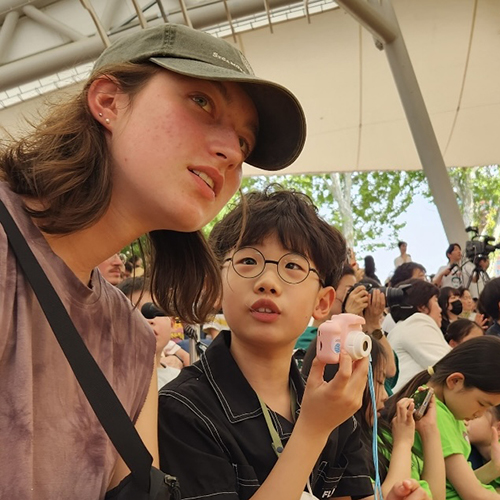When Julia Parker was 15, she left home and dropped out of school. She lived on the streets of Seattle and took refuge on friends’ couches. She moved to Los Angeles. She moved to New York. She floundered for years.
Parker’s story has had many dark moments. But fast forward to 2006 and there’s a stunning twist. Not only has Parker turned her life around — volunteering in the community and earning a UW bachelor’s degree in philosophy — but she has funded an annual award in the UW Department
of Philosophy as well.

“The award was a last minute epiphany I had just before graduating,” explains Parker, who has designated that the award go to a student who has blended study of philosophy with a community project. “I had been so involved with the Philosophy Department as a student. I saw the award as a way to continue to be part of the department and recognize other philosophy students who are making a difference in the community.”
Parker was drawn to philosophy from the moment she arrived at the UW. “I think what attracted me initially was reading some of the ancient writers,” she recalls. “I also liked the small size of the department. I immediately felt at home there. I felt as if I could really get to know my professors and get help if I needed it.”
Parker, whose father was a federal prosecutor, took courses on the philosophy of law and human rights. She envisioned a career working with at-risk youth, and those classes got her thinking about the juvenile justice system.
As a homeless teen, Parker had seen friends deal with the system, with little awareness of their rights. She decided to reach out to the next generation of teenagers, offering a class titled “Human Rights and the Law” for teens at the Ravenna-Eckstein Community Center. She developed the class as an independent study project, working with Bill Talbott, professor of philosophy. Guest speakers included faculty from the UW School of Law’s Children and Youth Advocacy Clinic.
“Seeing how little the teens in the class knew about their rights, and remembering how I was the same way, my desire to work in juvenile justice became more targeted to being a child advocate,” says Parker, who spent the past summer interning at Washington State CASA (Court Appointed Special Advocates), an organization whose volunteers serve as advocates for children.
Having found ways to combine her philosophy study and community service, Parker wanted to inspire others to make similar connections. She created The Kenneth R. Parker Award for Excellence in Community Service — named after her father, who died when Parker was 17— to do just that. Each year a philosophy student will receive $250, with an equal amount going to an organization of the student’s choosing.
For those who cite limited finances as a reason for not giving to the UW, Parker exemplifies the old adage, “Where there’s a will, there’s a way.” She has funded the award for the next four years, and plans to continue the award indefinitely.
“Family and close friends donated, and the rest I’m coming up with myself,” explains Parker. “I hope to increase the size of the award down the road.”
The first recipient of the Parker Award will be announced in June 2007, when the next batch of philosophy majors is set to graduate.
“It will be exciting to hear about other students’ community projects and their impact,” says Parker. “Really, I just wanted to encourage students to go beyond their books.”
More Stories

Is This Presidential Campaign Different?
UW History professor Margaret O'Mara provides historical context for this moment in US presidential politics.

Making Sense of This Political Moment
To navigate this momentous election season, Arts & Sciences faculty suggest 10 books about the US political landscape.

Finding Family in Korea Through Language & Plants
Through her love of languages and plants — and some serendipity — UW junior Katie Ruesink connected with a Korean family while studying in Seoul.